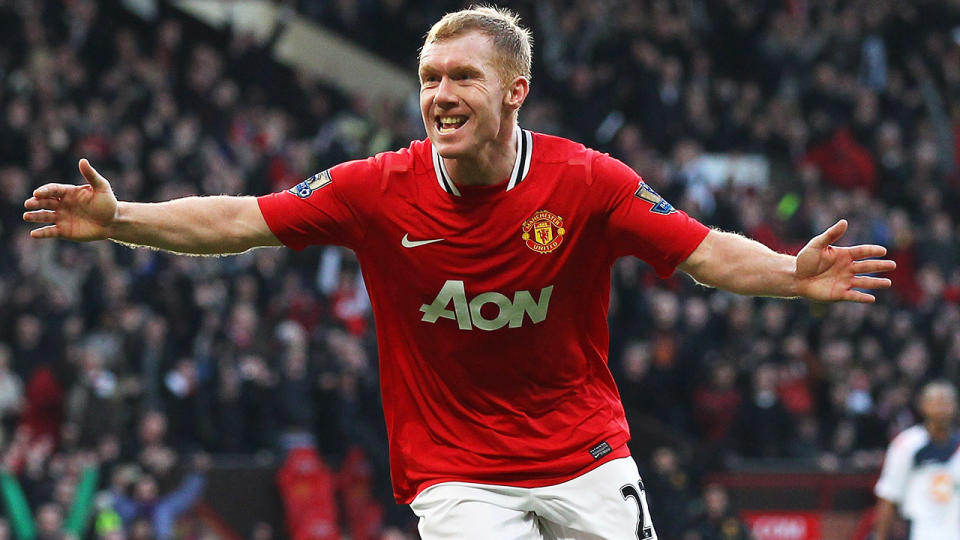'Reckless behaviour': Football legend's illegal party in virus hotspot

English football legend Paul Scholes was visited by police after throwing a house party in contravention of virus restrictions.
The former England and Manchester United midfielder has been accused of holding a party at his Oldham home in Manchester for his son’s 21st birthday - on the same day lockdown measures were reimposed across parts of the North West of England.
‘I”M THE EXPERT’: Mark Bosnich's brutal swipe at colleagues
BRUTAL: $300 million blunder haunts relegated EPL side
The Sun cited phone footage as showing revellers ignored social distancing “as they drank and danced” at the seven-hour party on Friday, with the paper citing Tory MP Andrew Bridgen criticising Mr Scholes for “reckless behaviour”.
“You'd expect a much more responsible attitude from a role model who has worn an England shirt 66 times,” Bridgen said.
“The people of Oldham are fully aware reckless behaviour like this has caused the return to lockdown.

“While young people are less likely to suffer serious complications if they are infected, they may spread it to somebody for whom the consequences could be very severe.”
Greater Manchester Police said they attended the property and encouraged those present to “be compliant” with the newly-imposed restrictions.
Scholes, 45, appeared in a photo posted to social media wearing a “Lockdown Live” T-shirt with DJ Zac Caulcutt.
Scholes’ daughter Alicia, 19, was also in a number of photos posted to social media.
Scholes’ party was allegedly held just hours after a major incident was declared in Greater Manchester due to increases in coronavirus infection rates across “multiple localities”.
Local MP Debbie Abrahams said: “We all need to play our part. I urge everyone to follow the new guidelines.”
Major incident declared in Manchester
Health Secretary Matt Hancock announced late on Thursday that as of Friday, people from different households in Greater Manchester, parts of east Lancashire and West Yorkshire would be banned from meeting each other inside their homes or in gardens following a spike in virus cases.
The new rules also banned members of two different households from mixing in pubs, restaurants and other hospitality venues, but those businesses are permitted to remain open for those visiting individually or from the same household.
“Although the council and partner organisations have been working closely to tackle the impacts of the pandemic since early this year, declaring a major incident means we can ramp this up further,” the Leader of Manchester City Council Richard Leese said in the Manchester Evening News.
“It allows the establishment of a central command structure to oversee the response and enables agencies involved to draw on extra resources.”
Out of the top 20 worst affected local authority areas for COVID-19 infections in England, Greater Manchester boroughs make up more than a third of the list with seven entries.
Oldham, the second worst affected borough in the country, saw its seven-day rate jump from 41.6 to 62.8 per 100,000 people, with 148 new cases reported in the past week.
Assistant Chief Constable Nick Bailey, chairman of the Local Resilience Forum in Greater Manchester, said the Strategic Coordination Group met to discuss regulations in response to last week’s announcement.
“Recognising that there are multiple localities across Greater Manchester seeing rises in infection rates, the group reviewed learning from other recent areas, including Leicester, and its own learning from across the partnership and have taken the decision to declare this a major incident in order to respond as effectively as possible,” he said.
“This will enable us to maximise the capability of agencies across Greater Manchester, including additional resources if required, to instigate a prompt and positive change in direction.”
He said the decision to declare a major incident was about protecting the population by aiming to reduce infection rates and eventually allow the region to return “to as near a state of normality as current times allow”.
The pandemic has killed more than 46,000 people in Britain, the fourth highest toll in the world, according to a Reuters tally collated on Sunday.
with agencies

